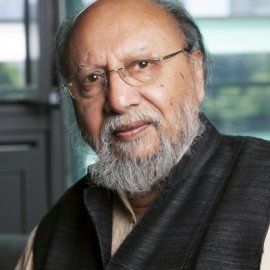Sociology, Center for Studies on Developing Societies (CSDS), New Delhi, India

Avril à Juin 2014 (résidence précédente en 2007)
Ashis Nandy, a political and cultural psychologist and futurist, has been associated with the Centre for the Study of Developing Societies, Delhi, for more than four decades and also with many movements and initiative exploring alternatives in various spheres of knowledge and culture. In 2007, Nandy was awarded the Grand Prize of the Fukuoka Asian Culture Prizes, and in 2008 he was chosen one of the top 100 public intellectuals of the world by the journal Foreign Policy and the Carnegie Endowment for Peace. He was a National Fellow of the Indian Council of Social Science Research during 2002-04.
Nandy’ work has alternated between human destructiveness and human potentialities. And he has combined these interests with efforts to move out of conventional scholarship, to build into his work categories and sensitivities used in marginalised knowledge systems surviving in the backwaters of the world. His earlier books includeAlternative Sciences: Creativity and Authenticity in Two Indian Scientists (Oxford University Press, 1995), The Tao of Cricket: On Games of Destiny and the Destiny of Games (Oxford University Press, 2000), An Ambiguous Journey to the City: The Village and Other Odd Ruins of the Self in Indian Imagination (Oxford University Press, 2000), Romance of the State and the Fate of Dissent in the Tropics (Oxford University Press, 2008), Time Warps (Rutgers University Press, 2002), and Traditions, Tyranny and Utopias (Oxford University Press, 1988).
Alternative cosmopolitanism
The dominant model of cosmopolitanism, for long accepted as the only viable form of cosmopolitanism, includes as well as excludes. Some scholars recognize this, but it is doubtful if their voices are audible outside small circles of area specialists and cultural historians. Yet, during serious outbreaks of violence, many communities throw up persons and groups that deploy their tacit, local versions of ‘neighbourliness’ to resist the violence. In an ongoing study of the mass violence at the time of the birth of India and Pakistan, for instance, forty per cent of the survivors said they had been helped by persons from the 'other side’ and/or knew of such help given to relatives, friends and neighbours. Sometimes such rescuers were killed along with the targeted persons and families.
What explains such resistance? Can one find clues to it in alternative forms of cosmopolitanism and in non-modern forms of hospitality more comfortable with radical or extreme forms of diversity? Are there alternative resources in cultures not ‘blessed’ with the Enlightenment-inspired values that can be mobilized against genocidal projects of our times? These questions have remained underexplored and under-theorized.
The study hopes to identify some components of such alternative forms of cosmopolitanism and hospitality and the untamed language of dissent that undergirds them.